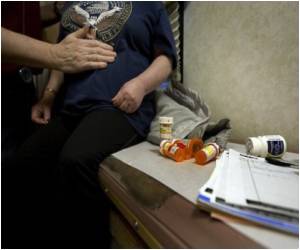Depressed patients with signs of systemic inflammation have elevated levels of chemical glutamate in regions of the brain that are important for motivation.

‘The brain chemical glutamate is a messenger used by neurons to communicate. Elevated levels of glutamate is found in depressed patients which can become toxic for neurons.
’





"Our results suggest that inflammation markers can guide us to which depressed patients respond best to glutamate blockers," says lead author Ebrahim Haroon, MD, assistant professor of psychiatry and behavioral sciences at Emory University School of Medicine and Winship Cancer Institute. "This could be an important step toward personalizing treatment for depression." Glutamate is a chemical messenger used by neurons to communicate. However, at high levels, it can become toxic to both neurons and glia, cells that support brain health. It is unlikely that the elevated levels seen in some depressed patients are acutely toxic, Haroon says.
"Still, we think that one of the ways that inflammation may harm the brain and cause depression is by increasing levels of glutamate in sensitive regions of the brain, possibly through effects on glia," he says.
Researchers examined 50 patients with depression who were not receiving antidepressant medication at that time. Inflammation was determined by a blood test for C-reactive protein (CRP), which was measured on repeat visits to make sure its levels were stable.
The team used an imaging technique called magnetic resonance spectroscopy (MRS) to measure glutamate levels in the basal ganglia, a brain region important for motor control, motivation and decision making. The researchers also measured levels of myo-inositol, a marker of glial health.
Advertisement
"We focused on the basal ganglia because we had previously seen that a treatment for hepatitis C virus that arouses inflammation and can trigger depressive symptoms could also increase glutamate levels there," Haroon says.
Advertisement
A previous study of people with difficult-to-treat depression found that only those with high inflammation markers tended to improve in response to the anti-inflammatory antibody infliximab.
The findings of the study published in Molecular Psychiatry.
Source-Eurekalert












